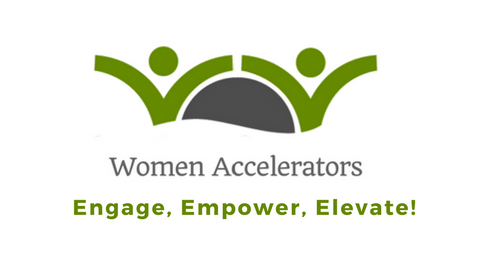Welcome to the Women Accelerators Mentor Journal!
We are one month into our Mentorship Program and many great discussions have begun. As I go through my work week, I’ve been re-reading a note I took at our first mentor meeting:
If coworkers are unresponsive, follow up. Ask for a meeting. Use phrases and words like “constructive feedback”, “smoothness” and “efficiency”.
I’ve put this idea into action a few times since I first met with my mentor in February. Advice like this — delivered via one-to-one relationships — is so crucial and nurturing in our competitive workplace. In this and three following blog posts (May, July, and September), we will be recording and sharing more great tips like this from mentors and their mentees.
A little background on our program: Our 2017 Mentorship Program session consists of 9 mentors and 37 mentees. Meetings are in a group session (in person or remote), with 3-6 mentees and one mentor. This is the fourth year of the program, with the largest attendance. In January, 45 women signed up for our mentor “speed networking”, where they had the chance to meet our mentors for five minute discussions. Matches were made the following week, based on their interests and personal preferences from our surveys and groups met for the first time in February and March.
To find out what our mentees and mentors are learning, and help in areas where teams are stuck, we are communicating with them more often than we have in the past. The result, we hope, will be a rich online discussion to help our participants and beyond!
All mentees are first time mentees with Women Accelerators. Some of our mentors are also new to mentoring. Given this fact, we thought it would be helpful to define the mentor-mentee relationship. One of our mentees asked: Is there any structure in being mentor / mentee?
We are encouraging all groups to meet at least once a month, to build their relationships and discussions. Some may be going through career transitions — finishing a degree program, finding a new job, etc. — so six months is a great arc throughout which transformations can be seen.
At the start of the program, we asked participants to state their goals and interests. This helped us identify the best matches for their mentor groups. Some of our mentees discussed their goals with their teams at their first meeting. Those initial goals are great to revisit monthly, or however often it seems appropriate.
Our hope is that mentorship can fill the gaps where support is missing in the workplace. There are a wide range of areas where mentors can help!
- Navigating a workplace conflict/politics
- Issues specific to women, which may be uncomfortable to ask about. For example, how can women get recognized for their strengths when they are less likely to speak up?
- Providing personal stories about how they overcame challenges
- Giving advice about how to buy a suit
- Learning how to feel more confident
- Escaping a toxic work environment
Mentees should attend meetings prepared with a few questions or scenarios to share. For example:
- How can you communicate with someone who constantly changes their mind?
- Why did I feel more confident in college, compared to in the workforce?
- What is the best way to ask for a raise?
Being as specific as possible is helpful. It’s likely that others may have similar questions or experiences — when the mentor answers, others are encouraged to take notes and add on their thoughts.
Each group dynamic is bound to be different, and everyone has something to gain from their mentor and fellow mentees. Here are some great things our mentees are learning already:
The personal stories from the mentor but also the other mentees were very inspiring!
It might not seem super useful, but just knowing that others are feeling similar to me is very helpful to me. I have a lot of friends who seem to know exactly what they want out of their careers, but I’ve always been interested in so many things. It’s nice to know that others feel the same struggle sometimes!
Ways to tackle language challenges, personal stories about changing state of mind and shifts in careers
Network is important, try to get more interviews for practises
Confidence is the key to everything. Changing our mindset about time, money, presentation… can change how we are perceived.
It was great to hear from not just my mentor but also mentees as suggestions that can improve at workplace.
I really appreciated meeting other women who are in varying states of professional transition, like myself. We all have a lot of wisdom to share, which is very valuable.
Stayed tuned for our second entry of Mentor Journal! Next time, we’ll turn the focus back on our mentors. What are some ways to ensure mentorship is successful? Are there activities mentor teams can work on together?

